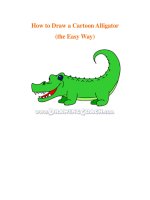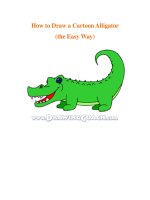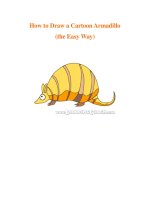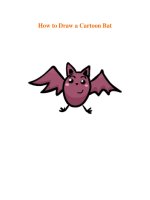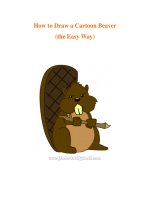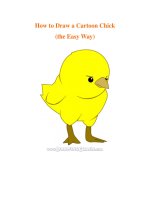3 Key Tips on How to Draw a Nose Made Easy pdf
Bạn đang xem bản rút gọn của tài liệu. Xem và tải ngay bản đầy đủ của tài liệu tại đây (44.04 KB, 5 trang )
3 Key Tips on How to Draw a
Nose Made Easy
Learning how to draw a nose can seem a little daunting at first. The key tip when
drawing ANY of the features of the face is Keep it Simple!
Less is always more when drawing the nose as well as when drawing mouths, but
that's another lesson. What you want to do is draw the nose with lines that suggest
the shape but don't create hard outlines. There are many different ways to draw a
nose, sure, but if you're looking to draw a realistic one, keep your lines light and
deliberate. If you want to draw cartoon noses, hard outlines work very well, but
you should still keep them simple.
There are three sections you can divide the nose into
1: The Top
The part just by the eye sockets is where the brow begins to slope down into the
nose. This area looks like two parentheses or commas facing away from each
other. Of any of the lines of the nose, these will mostly likely be the darkest as
they will suggest the depth of the eye sockets.
2: The Middle
This part of the nose is made up mostly of cartilage and doesn't really have any
sharp slopes toward the face. This is why the lines aren't very dark.
Tip: Just remember that the sharper the slope or angle, the darker and more
defined the line should be.
3: The Tip
The tip of the nose is all cartilage, and this part of the nose can vary in shape
probably more than any other part of the nose.
When drawing this part of the nose, the key is to Keep it Simple and use the
least amount of lines as possible.
You'll quickly notice that the nostrils aren't just two circles; instead, they are more
shaped like a sunflower seed or almond. The nostrils really are dependent on the
shape of the end of the nose. A fat nose may have wider nostrils, while a thin nose
may have long skinny nostrils. It may take some practice and observation before
you become proficient at this part of the nose.
Really, once you start looking at and studying all the features of the face, they all
start to look a little weird. It's very easy to start drawing every line you see; that's
why it's important to KEEP IT SIMPLE!
Tip: A very simple technique to use when trying to simplify what you see is to
squint as you look at your subject. This takes out or blurs the detail and subtleties
so you can see more general shapes and colors.
Learning how to draw a nose does take some time to get just right. There are
plenty of books and magazines with plenty of faces to practice with. Once you get
the proportions of the face down and learn how the different features fit together,
then you can really start to have fun and experiment. Your confidence level will
grow exponentially, allowing you to experiment more and push your skills even
further.
Since it does help to have a quality visual reference to look at when learning to
draw, especially when learning how to draw a nose, I have created a downloadable
reference file for you to use. It has all the different angles of the nose as well as
some examples drawn using a few of the reference photos. Get it here and start
digging in!
